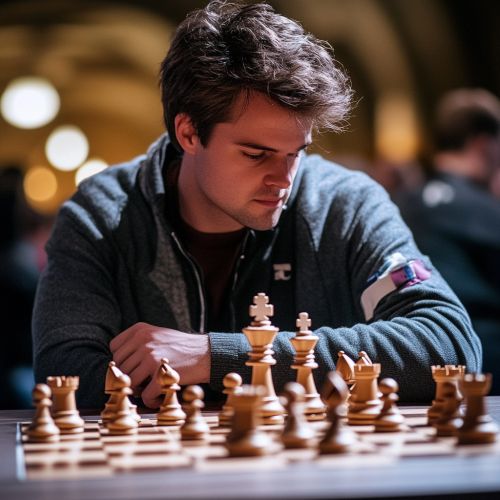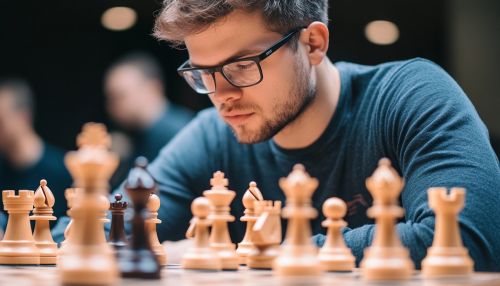Grand Master Award: Difference between revisions
(Created page with "== Introduction == The Grand Master Award is a prestigious accolade bestowed in various fields to recognize exceptional mastery and contributions. This award is often associated with disciplines such as chess, martial arts, and literature, where the title of "Grand Master" signifies the highest level of achievement and expertise. The criteria, significance, and historical context of the Grand Master Award vary across different domains, reflecting the unique s...") |
No edit summary |
||
| (One intermediate revision by the same user not shown) | |||
| Line 32: | Line 32: | ||
In chess, the Grand Master title is a symbol of the highest level of competitive achievement. It opens doors to elite tournaments, sponsorship opportunities, and teaching positions. Grand Masters are often sought after for their expertise and are influential in shaping the future of the game. | In chess, the Grand Master title is a symbol of the highest level of competitive achievement. It opens doors to elite tournaments, sponsorship opportunities, and teaching positions. Grand Masters are often sought after for their expertise and are influential in shaping the future of the game. | ||
[[Image:Detail-97997.jpg|thumb|center|A chess Grand Master playing in an international tournament.|class=only_on_mobile]] | |||
[[Image:Detail-97998.jpg|thumb|center|A chess Grand Master playing in an international tournament.|class=only_on_desktop]] | |||
=== Martial Arts === | === Martial Arts === | ||
Latest revision as of 11:20, 15 September 2024
Introduction
The Grand Master Award is a prestigious accolade bestowed in various fields to recognize exceptional mastery and contributions. This award is often associated with disciplines such as chess, martial arts, and literature, where the title of "Grand Master" signifies the highest level of achievement and expertise. The criteria, significance, and historical context of the Grand Master Award vary across different domains, reflecting the unique standards and traditions of each field.
History
The concept of the Grand Master Award has its roots in medieval guilds, where the title of "Master" was given to individuals who had achieved the highest level of skill in their craft. Over time, this evolved into the modern Grand Master title, which is now used in various professional and competitive arenas.
Chess
The title of Grand Master in chess is one of the most recognized and respected awards in the world of competitive chess. It was officially introduced by the Fédération Internationale des Échecs (FIDE) in 1950. The first recipients of the Grand Master title were selected based on their performance in international tournaments and their contributions to the game.
Martial Arts
In martial arts, the Grand Master title is awarded to practitioners who have demonstrated exceptional skill, knowledge, and dedication to their art. This title is often accompanied by the awarding of a high-degree black belt, signifying the individual's mastery and teaching ability. The criteria for becoming a Grand Master vary between different martial arts disciplines, but generally include decades of practice, teaching, and contributions to the martial arts community.
Literature
The Grand Master Award in literature is often given by literary organizations to authors who have made significant contributions to the field over their lifetime. One notable example is the Science Fiction and Fantasy Writers of America (SFWA) Grand Master Award, which honors authors for their outstanding body of work in the genres of science fiction and fantasy.
Criteria and Selection Process
The criteria and selection process for the Grand Master Award differ depending on the field. However, common elements include a rigorous evaluation of the individual's achievements, contributions, and impact on their respective domain.
Chess
In chess, the Grand Master title is awarded based on a combination of Elo rating and performance in international tournaments. Players must achieve a minimum Elo rating of 2500 and earn three Grand Master norms, which are performance benchmarks in high-level tournaments. The norms must be achieved in events that meet specific criteria, including the participation of other titled players and a minimum number of rounds.
Martial Arts
The process of becoming a Grand Master in martial arts typically involves a formal evaluation by a panel of senior practitioners. Candidates must demonstrate their technical proficiency, teaching ability, and contributions to the martial arts community. This may include publishing instructional materials, developing new techniques, or promoting the art through seminars and demonstrations.
Literature
In literature, the selection process for the Grand Master Award often involves a nomination and voting procedure by members of a literary organization. The criteria for selection include the author's body of work, influence on the genre, and contributions to the literary community. The award is typically given to authors who have had a long and distinguished career.
Significance and Impact
The Grand Master Award holds significant prestige and recognition in each field, serving as a benchmark of excellence and a source of inspiration for others. Recipients of the award are often regarded as leaders and role models within their communities.
Chess
In chess, the Grand Master title is a symbol of the highest level of competitive achievement. It opens doors to elite tournaments, sponsorship opportunities, and teaching positions. Grand Masters are often sought after for their expertise and are influential in shaping the future of the game.


Martial Arts
For martial artists, the Grand Master title signifies a lifetime of dedication and mastery. It carries a great deal of respect and authority, allowing Grand Masters to influence the development of their art and mentor the next generation of practitioners. The title also enhances their credibility and marketability as instructors and seminar leaders.
Literature
In literature, the Grand Master Award is a recognition of an author's enduring impact on their genre. It often leads to increased visibility, sales, and opportunities for speaking engagements and collaborations. The award also serves to highlight the contributions of authors who have shaped the literary landscape and inspired other writers.
Notable Recipients
The Grand Master Award has been bestowed upon many distinguished individuals across various fields. Some notable recipients include:
Chess
- Garry Kasparov - Widely considered one of the greatest chess players of all time, Kasparov became the youngest ever undisputed World Chess Champion in 1985.
- Magnus Carlsen - The current World Chess Champion, known for his innovative and aggressive playing style.
Martial Arts
- Bruce Lee - A legendary martial artist and actor, Lee is credited with popularizing martial arts in the West and developing the martial art philosophy of Jeet Kune Do.
- Helio Gracie - A founding figure in Brazilian Jiu-Jitsu, Gracie's innovations and teachings have had a profound impact on the martial arts world.
Literature
- Isaac Asimov - A prolific science fiction author, Asimov's works have had a lasting influence on the genre and popular culture.
- Ursula K. Le Guin - Known for her groundbreaking works in science fiction and fantasy, Le Guin's writing has been celebrated for its depth and imagination.
See Also
- Fédération Internationale des Échecs
- Elo rating
- Jeet Kune Do
- Science Fiction and Fantasy Writers of America
